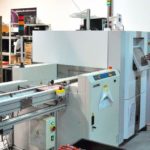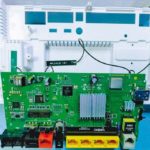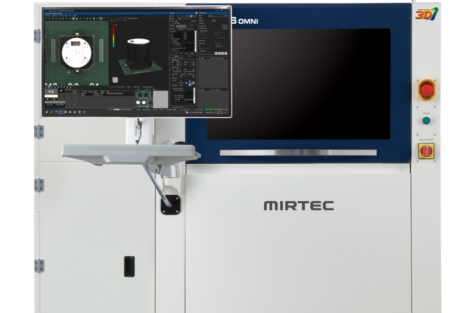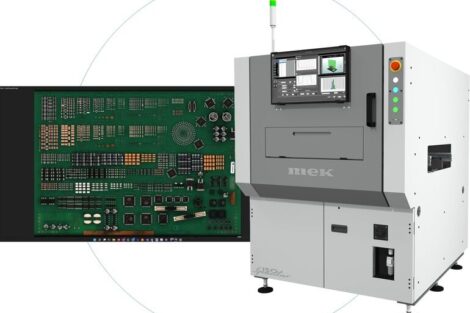Understanding a factory’s flows and processes requires quantifying (measuring) them. A high error rate decreases the efficiency and the output, and results in extra cost at the end, which is why any software that helps to measure and understand is useful. Traceability is the new insurance policy manufacturers cannot live without—and it is showing promising benefits for both upstream and downstream production practices.
In today’s highly competitive electronics market, manufacturers are under constant pressure to improve the speed and efficiency of their processes without sacrificing quality. ICCO EMT is part of ICCO group in Romania, which manufactures 55 new product introductions (NPIs) and 3.5 million finished goods a year with three surface mount technology (SMT) lines, two of which are Internet of things (IoT) boxes. They started out as reseller of pick-and-place machinery from Kulicke & Soffa (K&S). Today, they are also a customer of K&S, using their equipment to provide fast, high-quality manufacturing services for a wide variety of businesses and markets, including automotive, medical, and consumer electronics.
Challenge of producing multiple projects simultaneously
As a low-volume, high-mix producer, the company is faced with the daily challenge of NPIs that are characterized by increasing complexity and a growing bill-of-materials (BOM), increasing the possibility of error and waste.
In the past, they often had to do time-consuming manual counting for the component to ensure that the plan was fulfilled, and the production was counted manually by operators. The quality data were recorded by the AOI operator, and somebody centralized that information to create excel reports.
Some of the methods used in the past were good but did not give the possibility to react fast and in time. For example, the quality reports were analyzed by management the day after without having the option to correct something immediately. It was the same story for the inventory, issues were found after count, not immediately. In addition, for NPI, their process included sticky tape. They had to produce one board, check it, and then make corrections. Because they produce an average of four NPIs per week, plus additional small to medium batch size production, they are able to save at least 10 hours on this process alone by using digital solutions.
The company introduced their own PCB assembly process using K&S machines. ICCO serves as a beta site for new K&S software releases. In this win-win situation, they have access to the most advanced, cutting-edge software, and K&S can test their software in a real production environment. ICCO is highly involved in the K&S’s software development process and can influence it as well, providing the feedback that is so essential in the release of stable, fine-tuned software systems.
Siemens provides K&S with OEM materials-management capabilities for their production software. While working with K&S, ICCO was exposed to Siemens’ digital manufacturing software, and evaluated the solutions for their own use.
Creating good data
Inventory management is a key process in the product flow. The complexity of inventory tracking and reporting directly relates to the size of inventory. In the electronics manufacturing industry, building the product requires components, 90 % of which are medium size to very small. Ongoing annual count of the components is impossible because of their size and quantity, so a very good track and report of the track is important.
Being able to create different types of reports is necessary in a modern factory and for industries such as automotive, medical, or military for full control of inventory, of what and how it is produced, and full traceability of the product. When the manufacturing execution system (MES) software is able to do that, the crosscheck for high-count and high-cost materials with the help of manual inventory is no longer a nightmare.
The company uses Valor Process Preparation software in every project to build the programs and for stencil design. ICCO’s high project mix requires them to plan multiple projects simultaneously, and Valor Process Preparation allows them to plan two to three products simultaneously. With this tool, their production team automatically verifies the orientation and position of components as designed in their CAD system, helping to save time and reduce errors and waste.
Marius Stepanescu, Technical Director, explains, “Now we get it right the first time. With Valor Process Preparation, there is no need to check orientation and positioning, which is a big-time saver. With Valor Process Preparation, we do the whole thing digitally, saving two to three hours depending on the complexity of the board. Since we produce an average of four new boards per week, we save at least 10 hours on this process alone. For the first time, we can now prepare multiple plans simultaneously.”
They also use Siemens Opcenter Execution Electronics IoT software to acquire valuable manufacturing data that is used to analyze and improve production processes. The software runs on any Linux based system and easily connects to the devices on the line, generating a real-time digital twin of shop-floor performance.
Unified IoT controller to collect and manage data
Using these solutions, ICCO was able to streamline their operations, replacing multiple controllers with a single, central IoT controller. The unified controller collects data from all the machines and allows their users to log in and view data on their mobile phones.
The IoT-generated data is then transmitted to Opcenter Intelligence Electronics, which has powerful analytics and reporting capabilities that enable ICCO EMT to perform numerous compliances and troubleshooting functions. This includes, board-specific data compilation and reporting, traceability data storage and reports, as well as, remediation of quality issues of all types, including pick issues and scrap rate reports. The reporting function helps ICCO discover trends and proactively perform maintenance when required, tracking machine uptime/downtime, and percentage of defects for example. The ability to track incoming material helped reduce their inventory levels.
Nicolae Pindaru, Executive Director, says, “Opcenter Intelligence Electronics has really helped us to improve the quality of our products. We have a better understanding of every stage of the manufacturing process and know exactly when, where and how to act in order to reach maximum efficiency.”
“Now the reports are generated automatically by Opcenter Intelligence Electronics. We can quickly respond to our customers’ queries with highly accurate information,” Marius says.
Using the Opcenter Execution Electronics IoT and Opcenter Intelligence Electronics tools, the company accelerated their shop-floor processes by 20 %, while cutting the number of errors nearly in half by using automated data mining processes and analytics. Performance data, once available only in historical reporting format, can now be accessed in real time when it is needed. Problems can be fixed immediately, and scrap is minimized.
They also leverage the traceability capabilities of Valor Material Management software, generating unique serial numbers for each PCB, which is now a common requirement of medical and automotive customers. The system enables components to be traced back to their suppliers. The material management capabilities streamline the requisition process, saving on the need for rush orders and keeping the lines running at all times.
This example shows how enterprises and SMBs (Small Medium Business) can use data to improve manufacturing performance, quality, and profitability. Collecting data and analyzing it simply is not enough—analytics create knowledge that positively affects manufacturing.
Siemens Aktiengesellschaft
Werner-von-Siemens-Straße 1
80333 Munich Germany
Tel. +49 89 636–00
E-Mail: contact@siemens.com
Website: www.sw.siemens.com
ICCO Group
Str. Spicului nr.3,
500460 Brasov, Romania
Tel.: +40 268 401212
E-Mail: icco@icco.ro
Website: www.icco.ro/emt
Marius Stepanescu Technical Director of ICCO EMT
Marius Stepanescu is the Technical Director at ICCO EMT, a company that offers PCB production and assembly services. Marius joined the company 21 years ago and has invested his entire career there. He started as a service engineer for the K&S pick and place. In 2007, he became the technical director, leading the service and the new engineering team from the production.
Shirley Segev Director of Marketing, Valor Division Siemens Digital Industries Software
Shirley Segev is a B2B marketing expert with more than 20 years’ experience in creating and implementing global outbound and inbound strategies. She holds an MBA from Derby University (UK) and is a certified Digital Marketing Manager and Training Manager, Tel Aviv University. In February 2019, Shirley joined Siemens Digital Industries Software as Director of Marketing, Valor Division.
Dies Beispiel zeigt, wie Unternehmen in der Elektronikfertigung Daten nutzen können, um die Fertigungsleistung, Qualität und Rentabilität zu verbessern. Es reicht nicht aus, Daten zu sammeln und zu analysieren – Analysen schaffen Wissen, das die Fertigung positiv beeinflusst.
L’exemple montre comme les entreprises peuvent utiliser des données dans la fabrication de matériels électroniques en vue d’améliorer les performances, la qualité et la rentabilité au niveau de la fabrication. Il ne suffit pas de collecter et d’analyser des données – les analyses permettent d’acquérir des connaissances qui ont des effets positifs sur la fabrication.
Этот пример показывает, как компании, занимающиеся производством электроники, могут использовать данные для повышения эффективности, качества и рентабельности производства. Недостаточно просто собирать и анализировать данные — результаты анализа пополняют знания, которые положительно влияют на производство.















